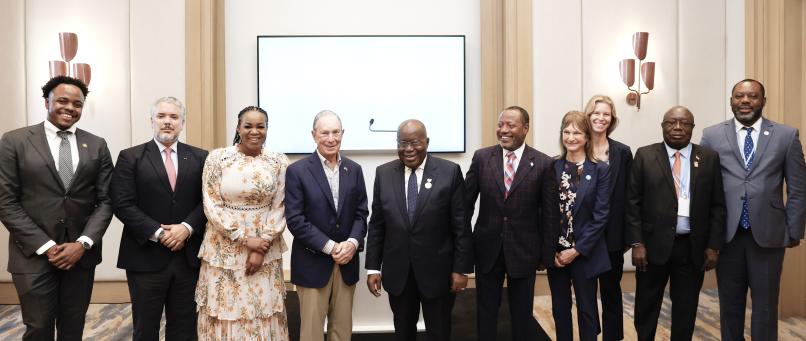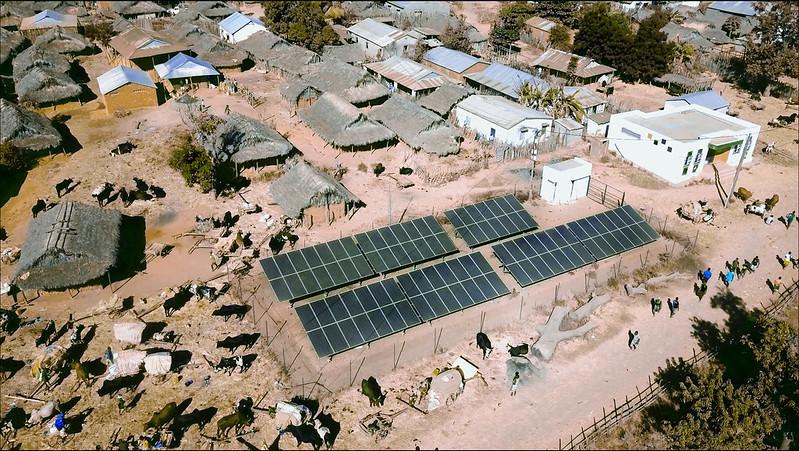Energy Compacts
In 2022, we also continued to promote and secure Energy Compacts along with our UN-Energy partners. Launched at the UN High-level Dialogue on Energy in 2021, this platform has led to nearly 200 approved commitments towards SDG7 and climate goals. Many of these commitments are already being acted upon, with USD 46 billion in investment having already been generated, 88 GW of renewable energy capacity installed, and 2,450 GWh of energy saved through energy efficiency measures, according to the first Energy Compact Progress Report prepared by UN-Energy.
Several compacts continue to attract new signatories, including those related to No New Coal, Green Hydrogen, Powering Healthcare, and 24/7 Carbon-Free Energy, proving the value of Energy Compacts in mobilizing action.
We help countries establish policies, regulations and plans that enable sustainable energy development. In 2022, we worked directly with countries and stakeholders in their energy sectors on bespoke plans that will attract investment and technical assistance.
Energy Transition Plans
These data-driven national plans are created to identify viable pathways for countries to end energy poverty and achieve net-zero emissions while marking opportunities for stakeholders to support these efforts. Nigeria was the first country to develop such a plan in 2021, with the support of the COP26 Energy Transition Council and SEforALL.
Although it was first unveiled at COP26, the government launched the Nigeria Energy Transition Plan in August this year. At the launch, the World Bank announced it had committed USD 1.5 billion towards the plan for renewable energy, power sector reforms, clean cooking, and additional opportunities.
We are now working closely with the Office of the Vice-President in Nigeria to help attract the plan’s targeted finance and assistance. Our work is being carried out through our new office in Abuja by a specific team dedicated to supporting the government.
Ghana has already partnered with us to develop their own Energy Transition Plan in 2023, and we will pursue similar partnerships with Barbados and additional countries as we grow this important body of work with the support of Bloomberg Philanthropies.

Integrated Energy Plans
We are setting the standard for what a best-in-class integrated energy plan should be and working with partners to make sure countries harness this important framework.
The plans use geospatial data and tools to identify the efficient integration of on- and off-grid solutions for energy supply (i.e., grid extension, mini-grids, and standalone solutions like solar home systems), while also considering demand-side factors like affordability. Together, this provides vital market intelligence to support investment.
In 2022, we collaborated with both Nigeria and Malawi to develop their integrated energy plans and launched online platforms for both so country stakeholders can easily access data for their decision-making.
Research, analysis and tools
A wide body of research and analysis underpins both our country engagement and global advocacy. In 2022, we developed new lines of research in response to country needs, such as a Powering Healthcare Nigeria Market Assessment and Roadmap, and practical tools to support policy-making, such as our new online Knowledge Hub.
We continued to provide thought leadership in the area of sustainable cooling thanks support from the Swiss Agency for Development and Cooperation and the Clean Cooling Collaborative. We again published our Chilling Prospects research, this time with a wider set of case studies, sectoral cooling data, and analysis of the enabling environment for cooling. And our cooling needs assessment framework has been adopted by the Cool Coalition for its global methodology for National Cooling Action Plans, which several countries have already implemented.
The world needs to scale and speed up energy access and transition efforts. Finance really is the lynchpin of progress, which is why we established a results-based finance facility two years ago to catalyse energy projects in Sub-Saharan Africa. Ensuring the fast delivery of electrification projects for critical services like healthcare is also a priority for us, especially given the recent COVID-19 pandemic.
Universal Energy Facility (UEF)
The UEF took a dramatic leap forward in 2022 on multiple fronts, thanks in large part to transformative new funding from the GEAPP and the IKEA Foundation.
A major highlight was the first set of electricity connections being established by mini-grids in Madagascar with projects financed by the facility. Thus far, the facility has paid out results-based grants for 654 electricity connections under its wave 1 mini-grids programme, with thousands more connections anticipating for 2023 across Benin, Madagascar and Sierra Leone.
Meanwhile, we launched a second wave of mini-grid finance this year for companies operating in Madagascar and Sierra Leone, and a new UEF-supported country, the Democratic Republic of the Congo.
Nigeria also became a UEF-supported country with the launch of a Standalone Solar for Productive Use programme, which is designed to scale up electricity access to households, and small and medium enterprises (SMEs), while displacing polluting diesel generators. There has been remarkable interest in this programme from energy developers, who will break ground on their projects in early 2023.

Powering Sierra Leone’s Hospitals
COVID-19 underscored how essential it is for health services to have reliable electricity, which is why our growing portfolio of Powering Healthcare work aims to accelerate electricity connections for health facilities in Africa.
Following a detailed energy needs assessment in Sierra Leone, we are now managing the electrification of six key hospitals in Sierra Leone with support from the UK’s Foreign, Commonwealth, and Development Office, directly impacting health service delivery and eliminating fuel consumption by adding more than 0.5MWp of installed solar PV capacity to the health sector.
Having achieved the above in 2022, we must now look to expand on both our longstanding bodies of work and nascent initiatives in the year to come.
We will continue to focus on advocacy and diplomacy to build global ambition and political support for SDG7 and energy transition, notably through engagement in major global fora like the G20 in India and COP28.
At the same time, we will continue to directly support priority countries, particularly by helping them create stronger policy and regulations with Integrated Energy Plans and Energy Transition Plans that will mobilize finance, as well as directing funding to energy projects through the UEF, which we hope to grow into a USD 100 million facility by the end of 2023.
We will also support the growth of the Africa Carbon Markets Initiative to attract energy and climate finance to Africa, and we plan to work with countries to grow their domestic renewable energy manufacturing, helping them reap the economic benefits of localized industries.
Importantly, we will continue to elevate areas of the energy transition that often get overlooked, including ensuring the transition supports gender and intergenerational equity. Along these lines, expanding our efforts to offer training opportunities to women and youth and ensuring their engagement in energy and climate negotiations will be a key priority in 2023.
Once again, thank you to all our partners and funders, whose support is critical to our work. We value your commitment to ending energy poverty and fighting climate change, and we look forward to another busy and impactful year of collaboration with you in 2023.
|
2 min. |
Welcome by moderator |
|
4 min. |
Opening Remarks
|
|
6 min. |
Youth in Action
|
|
10 min. |
Scene-setting
|
|
25 min. |
Panel discussion
|
|
10 min. |
Q&A |
|
3 min. |
Closing by moderator |
Over the last decade, the programme has supported countries across the world in developing evidence-based policies to increase the use of sustainable energy for the agri-food chain. Energy from the value chain can be in the form of bioenergy that uses crop and livestock residues for instance, while energy for the agri-food chain includes the use of renewable energy technologies like solar PV to increase cold storage and processing infrastructure.
A lack of cold storage facilities in developing countries makes rural populations more vulnerable to climate shocks and results in higher incidences of food losses. In Sub-Saharan Africa for instance, food losses between harvesting and processing account for 37 percent of food waste in the region. One of the reasons for the disproportionately high losses is the limited availability of electricity in rural areas where most of the food is produced. In Sub-Saharan Africa only 28.1 percent to the rural population had access to electricity in 2019 (World Bank 2019) which limits their ability to store food in a temperature-controlled environment.
One of the ways forward is to support developing countries to increase access to renewable energy to power cooling infrastructure. To do this, a multistakeholder approach is needed that requires farmers, the private sector and policymakers to assess and identify technologies that can be scaled up under specific country contexts.
FAO has already supported the Government of Rwanda in identifying and assessing the market size of decentralized solar cold storage for horticulture production and milk chilling and is currently working on a study to identify cooling needs and solutions for the value chain of small-scale fisheries globally. In the next three years, the expectation is that there will be an increase in the uptake of decentralized cold storage globally, especially for horticulture, dairy and meat value chains.
However, there is a need for governments to develop specific policies to increase the use of renewable energy to provide cooling along the agri-food chain. At the same time, stakeholders (public sector, private sector and funding institutions) need to encourage financial innovation to ensure that cooling solutions are affordable for small-scale farmers.